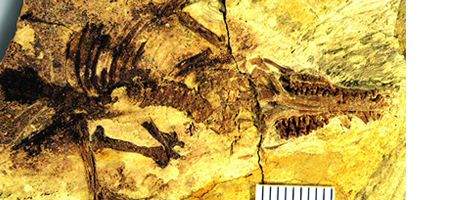Paleontologists have unearthed the fossilized remains of a creature that they say may be the ancestor of all placental mammals on Earth today.

A team of scientists led by Carnegie Museum of Natural History paleontologist Zhe-Xi Luo says the fossil shows that a major milestone in mammal evolution was reached 35 million years earlier than previously thought.
Juramaia sinensis was a small shrew-like mammal that lived in China 160 million years ago during the Jurassic period. It may have looked pretty unassuming, but it had several features that may have helped it survive in a tough Jurassic environment.
Its forelimbs are adapted for climbing, for example, which could have been an advantage in an era when most creatures lived exclusively on the ground.
And, importantly, it’s the earliest known fossil of eutherians — the group that evolved to include all mammals which provide nourishment to unborn young via a placenta.
It thus provides fossil evidence of the date when eutherian mammals diverged from the metatherians – whose descendants include marsupials such as kangaroos – and monotremes such as the platypus.
“Juramaia, from 160 million years ago, is either a great-grand-aunt or a great-grandmother of all placental mammals that are thriving today,” says Luo.
The fossil was discovered in the Liaoning Province in northeast China – its name means ‘Jurassic mother from China’. It has an incomplete skull, part of the skeleton, and, remarkably, impressions of residual soft tissues such as hair.
Most importantly, Juramaia’s complete teeth and forepaw bones show that it’s closer to living placental mammals than to the pouched marsupials.
Until now, the divergence point of eutherians from metatherians was unknown. DNA evidence suggested that eutherians should have shown up around 160 million years ago – but the oldest known eutherian, Eomaia, was dated to 125 million years ago.
The discovery of Juramaia now corroborates the DNA findings.
“Understanding the beginning point of placentals is a crucial issue in the study of all mammalian evolution,” says Luo.






